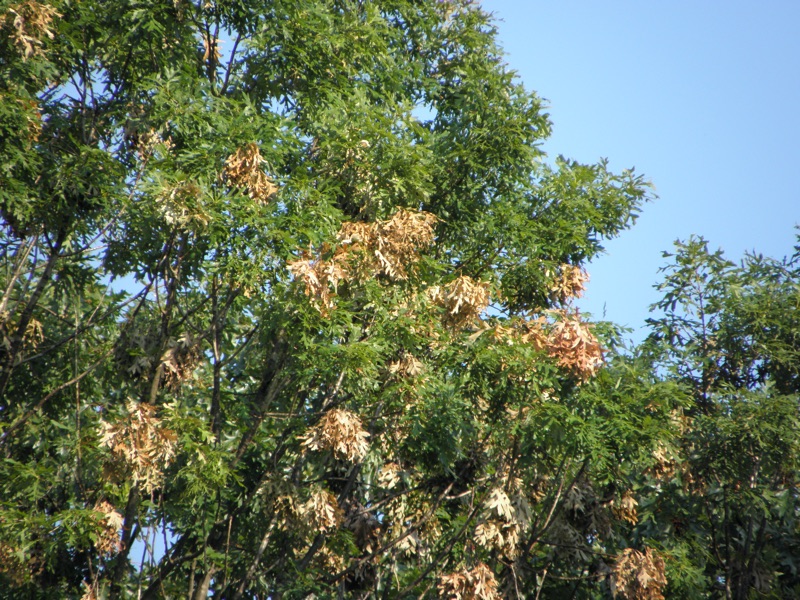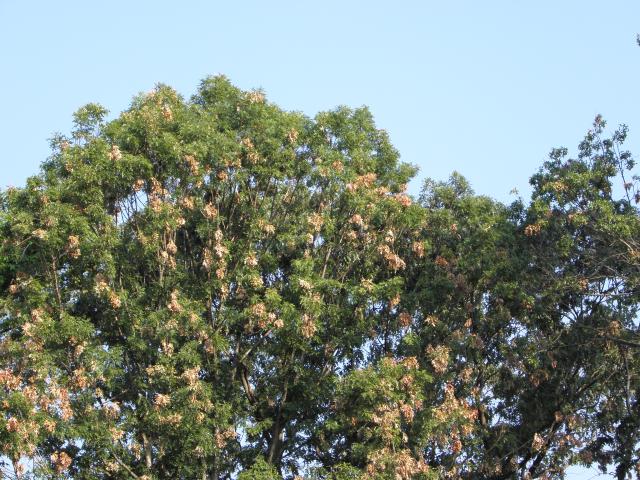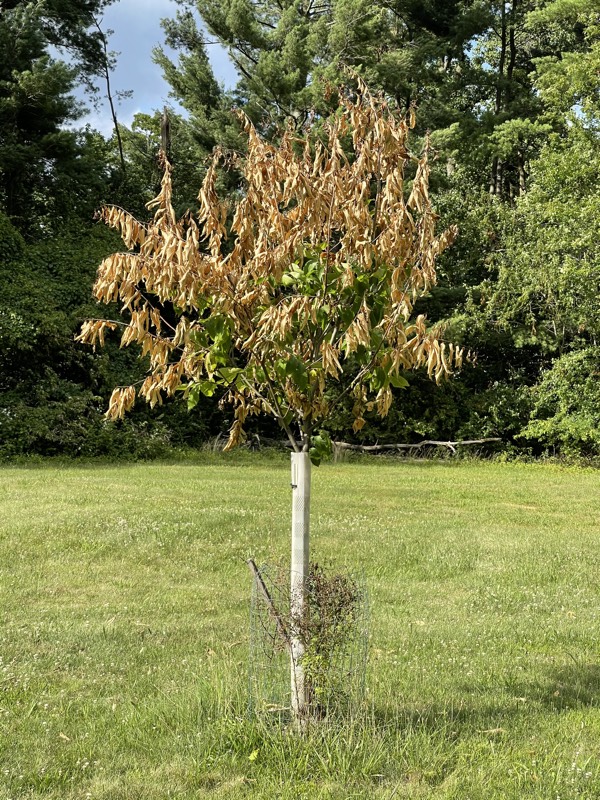Update (5/4/2024) Here is a link to a video on Twitter/X from the Chicago Botanical Gardens featuring the Garden’s plant healthcare supervisor, Tom Tiddens. He shows us how to net a tree to protect it from cicada egg laying.
As you may have heard, cicadas can damage trees, particularly young or ornamental trees, as they oviposit their eggs in branches. The damage to individual branches is often permanent, and in some cases the entire plant is lost. Native species of trees, like oak and maples, fare much better against cicadas because they have co-evolved for hundreds of centuries. Young trees and weaker non-native ornamentals, imported from outside the United States, fare a lot worse.
Female cicadas use their ovipositor to carve egg nests (egg grooves, punctures, baby cicada cribs) into the bark of tree branches:

Here is an illustration of the egg nests (baby cicada cribs):

Mature trees will receive some damage, but they recover. When branches are damaged they die and their leaves turn brown, which is called flagging:


Check out these articles on Flagging:
Netting and tree protection tips:
- Do nothing. Allow the cicadas to do what cicadas do, and let them prune the weakest branches of your trees.
- Use netting to protect tree branches. If you start looking now, you can probably find some at a local garden supply store or online from a store like Amazon. Here is a link to a video on Twitter/X
- Delay plantings until July.
- Pick them off by hand like they do in the grape farms of Italy.
- Spray them off with a garden hose.
- Foil around the trunk (to keep them from crawling up).
- Insect barrier tape.
- Consult with your local tree care expert. Find a local arborist or fancy tree expert, and ask their advice.
- Bagpipes (no joke, it worked at my friend’s wedding, at least temporarily).
- Do not use pesticides. It isn’t worth it. Bee populations are in bad shape so we don’t want to do any collateral damage to other species. After 28 years of running this web site, I’ve heard a few stories about family pets dying after consuming pesticide covered cicadas or grass. Don’t do it!
- Do not surround your trees with a ring of copperhead snakes. By now you have heard that copperhead snakes enjoy eating cicadas at night (although in the photos I’ve seen, they prefer larger species like Megatibicen auletes/grossus.). Gathering a dozen or so copperhead snakes can be time consuming and expensive and they are just as likely to bite you as they are to eat cicadas. Raccoons, bears, coyotes, foxes, and squirrels will also eat cicadas, but I also do not recommend enlisting their assistance. This last one was a joke.
Netting can be effective for keeping cicadas off branches, or on branches, as in the case of this video below where cicada researcher John Cooley had collected many cicadas and wanted to keep them for later. This video is proof that they cannot get through netting:
In my personal experience, which includes two Brood II emergence in my yard, I have seen plenty of flagging, but no death of a tree or shrub. That said, I do not have many small or ornamental trees. I have a 15′ dogwood, azaleas and rhododendrons.
Case study from 2021-2023:
Here’s a small (less than 10 feet) tree that experienced a lot of flagging during Brood X in 2021:

Here is the same tree in May of 2023:

The tree can be found at the Princeton Battlefield Monument park, and if can be seen on Google maps.
One reply on “Protecting your (weak) trees from cicada egg laying. Use netting, not copperhead snakes”
BEES,
Here in south florida, this year we had a man killed in his back yard fron a bee type known as the african bee’s. He did nothing but go into his backyard and notice a cluster in a tree then they sweept down on him, he was covered and died from the stings. Bee keepers are having a problem here with them takeing over. If we must exterminate anything it must be these bees that kill on sight. If any one wants a NewsPress story let me know.
Joe